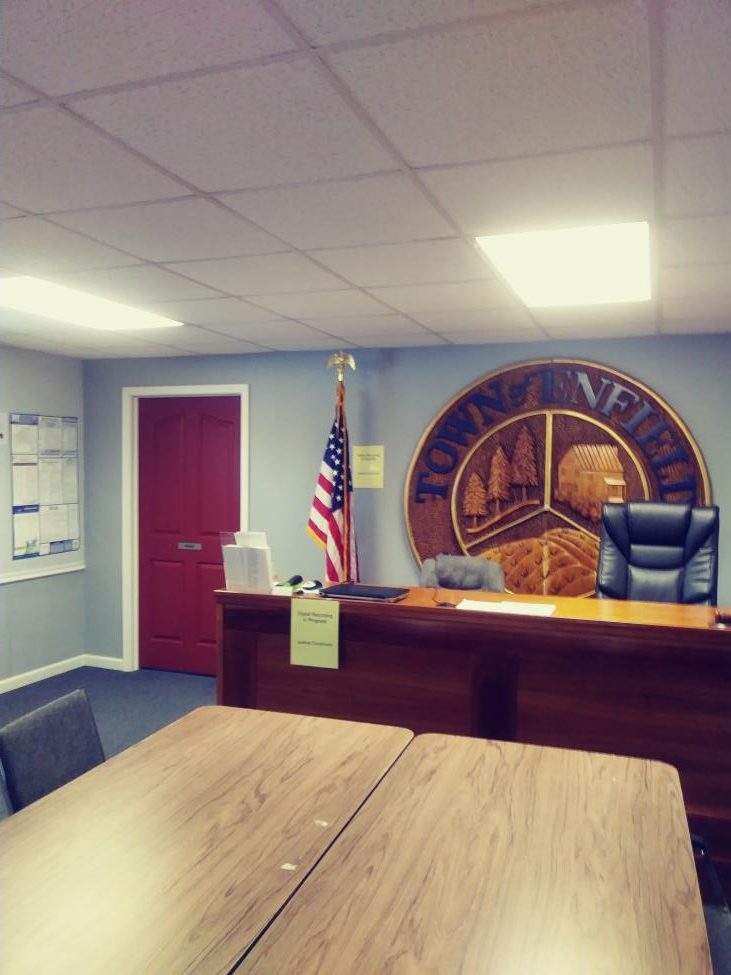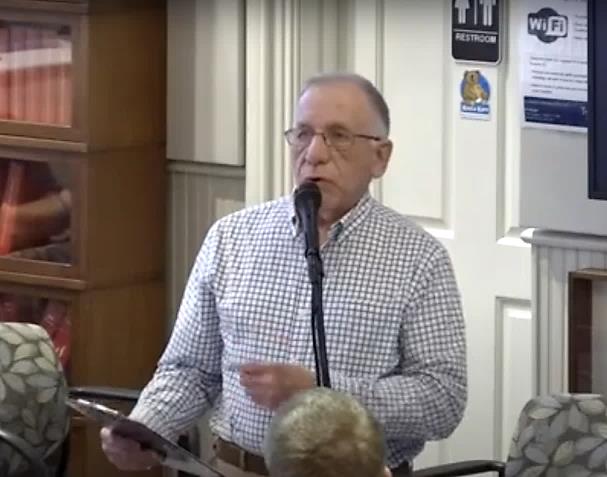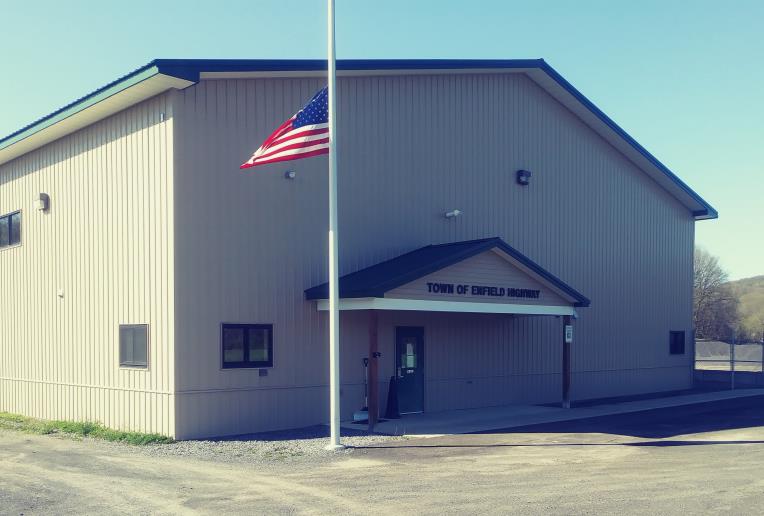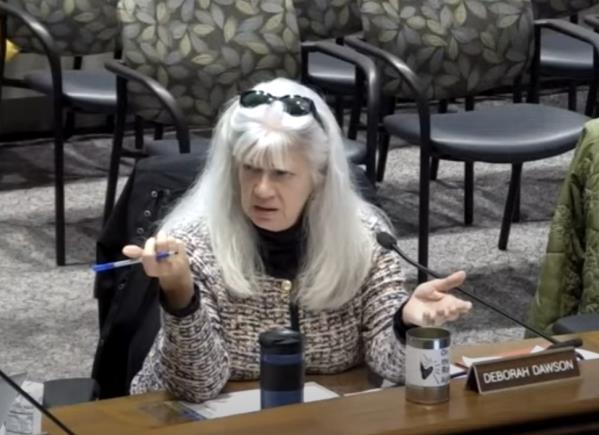Enfield Board adopts budget; taps $125,000 to throttle the tax levy
by Robert Lynch; October 23, 2024
The Enfield Town Board held a Public Hearing on its proposed 2025 Budget Wednesday night. It then adopted that budget, and in the process pulled a full $125,000 out of its savings account—the General Fund Balance—to offset spending increases and tamp down a tax hike that might otherwise run away.

The hearing drew just one attendee, a man who arrived late via Zoom and had no firm opinion on the budget either pro or con.
What followed thereafter were two, four-to-one votes; one of them to approve the final 2025 Budget; and the second to reject a Resolution submitted by Councilperson Robert Lynch (this writer). The Resolution would have locked last year’s building permit receipts from the giant Applegate Road solar project, $94,350, into a “Building Construction and Upgrades Reserve,” thereby confining the money’s use to long-term capital projects, rather than to everyday expenses.
“You’re smashing the piggy bank,” Lynch said multiple times as Town Board majorities, led by Supervisor Stephanie Redmond, defended subtracting $125,000 from the General Fund Balance to avoid an otherwise larger increase in next year’s taxes. Redmond’s four-vote majority also opposed the new reserve fund. The majority prefers the permitting fees float within the General Fund to help stabilize taxes in future years.
Despite the Board majority’s tapping of fund balance, the 2025 Enfield Town Budget will still carry a 6.12 per cent increase in the property tax levy. Additionally, perhaps controversially, the budget also increases by a full ten per cent Highway Department salaries, including that of Highway Superintendent Barry “Buddy” Rollins.
Next year, Rollins own salary will rise from its current $75,264 to $82,790.
Other Town employees will receive lesser raises. Supervisor Redmond and Town Board members will each receive raises of three per cent. Redmond’s pay would rise from $26,265 to $27,053.
“Anything that can be done to keep the budget as low as possible will be greatly appreciated,” Marcus Gingerich, the Public Hearing’s lone speaker from outside government, said after some initial hesitation.

Gingerich admitted he knew little about the budget. He did not comment on the salary increases proposed. And after Redmond pressed him for an opinion, Gingerich, though equivocal, appeared to lean toward keeping the solar money flexible, rather than in locking it into a reserve account.
In March 2023, Applegate Road LLC, better known by its parent firm, “Norbut Solar Farms,” purchased three identical building permits to construct a combined 15 Megawatt solar array on South Applegate Road. Except for annual in-lieu-of-tax (PILOT) payments to Enfield that many in government find too stingy, the $94,350 building permit fee marks the largest— and arguably the only—one-time payment from Norbut that the Town of Enfield will ever receive.
“The Town of Enfield owes to its residents the responsibility to be judicious with its one-time receipt of the afore-stated Applegate Road LLC building permit purchase payments and not to deplete those one-time revenues on day-to-day expenses,” Lynch’s rejected Resolution asserted.
“This is one-time money,” Lynch told the Board.
But for Supervisor Redmond and others, the argument fell on deaf ears.
Instead of squirreling the Norbut money into a reserve account, as Lynch had proposed, Redmond insisted that the Norbut payments are better spent providing short-term tax relief. By the Supervisor’s math, the Norbut windfall would exhaust itself with next fall’s 2026 budget.
“You’ve already spent that money and then some,” Lynch reminded Redmond, noting that the 2025 Budget draws $125,000 from Fund Balance.
Redmond defended her preference for tax moderation. She clung to a rationale recorded during her October 2023 budget presentation. She’d said she wanted to use the solar money little by little, year-by-year until the Town’s 2011 Highway Facility is “off-bond” and Town finances free up.
Lynch countered that the multi-year depletion of the permit fees was only Redmond’s recommendation and that the Town Board had never taken a vote to endorse it, Lynch also said that other capital projects will come along after the Highway building is fully paid. The Highway building’s aging furnace could fail, he said. And Lynch also repeated his request for a “Cold Storage Facility,” (an unheated barn) to shelter Enfield’s expensive construction machinery.
Redmond answered that Lynch and the Town ought to pursue grant opportunities for the furnace and storage building, remarking members’ time might be better spent than “being on Facebook” (presumably, in writing stories like this one.) Redmond insisted grant money’s out there.
“And Santa Claus is coming, too,” Lynch shot back.
Supervisor Redmond had initially proposed Highway Department raises of five per cent in her Tentative 2025 Budget, a document first presented the Town Board September 18th. But because of real-time, on-the-floor negotiations between the Board majority and Highway Superintendent Rollins that September night, Rollins secured for himself and his staff raises twice as large as what the Supervisor had first proposed.

Rollins mentioned during Wednesday’s budget hearing that the ten percent increase for him and those he oversees doesn’t tell the whole story “because the guys are taking over maintenance of cemeteries,” Rollins said.
True, in the horse-trading of September 18th, Rollins did agree to exchange for the higher raise a promise that Highway staff would resume mowing town cemeteries, a task performed in recent years by a private contractor. Yet those purported added responsibilities would still be done as a part of the staff’s normal workload, not performed as unpaid overtime.
Neither at its Regular October 9th Board meeting, nor in Wednesday’s post-hearing deliberations, did the Enfield Town Board alter a single line of the budget revisions it had made during its initial review session of mid-September. At the earlier October meeting, Councilperson Lynch had sought to alter as many as ten budget lines—in each instance proposing reduced increases—reductions addressing salaries for staff and elected officials, first-ever stipends for Planning Board members, and the Town’s annual subsidy to the Enfield Valley Grange. Board majorities then had rejected each of Lynch’s amendments.
No additional modifications were advanced this more recent Wednesday before the Board’s majority, over Lynch’s objection, called the question and hurried the vote.
Discussion then ended just as Lynch had prepared to detail the line item he’d most wanted to delete. It’s Highway Superintendent Rollins’ planned purchase of a new pickup truck, a vehicle to replace the Chevrolet 3500 HD the Town purchased in 2020 for just over $46,000, but which its replacement may cost $73,000 or more.
In prior meetings Lynch has maintained that the current vehicle is in good shape and that its replacement is both unnecessary and sends a bad message to the community in a tight budget year. Redmond and Rollins counter that the Town should adhere to a normal replacement schedule, trading pickups every five years or less.
Though effectively authorized through a budget transfer to buy the truck last February, Rollins said Wednesday he has yet to place the pickup’s order. “I’m working on it,” Rollins said, implying he’s mulling over which truck to buy and when. But even were he to place the order today, the Superintendent advised the Board, he couldn’t take delivery until next April or May.

As to the Fund Balance draw, Wednesday’s budget adoption drains Enfield General Fund savings by its largest amount in recent years. The $125,000 budgeted reduction compares with $26,000 subtracted from the General Fund Balance in 2022, $75,000 in 2023, and $60,000 for the current year.
Spending and revenues carry unpredictability. Thus, a budgeted subtraction from fund balance only estimates the actual withdrawal of funds at year’s end.
Helped, of course, by the Norbut money, Enfield’s General Fund Balance remains resilient. Even with the latest-approved $125,000 reduction, the account would still, by best estimate, hold $379,080 at the close of next year. A long-standing policy requires a quarter-million dollars be kept in the account at all times.
To support his argument Wednesday, this Councilperson marshaled the words of the Tompkins County Legislature’s arguably most zealous budget hawk, Deborah Dawson. She’d taken her own case against fund balance tapping to a committee-of-the-whole on October 8:
“There are so many reasons why I don’t like this annual discussion about whether or not we should suppress the tax levy by using Fund Balance,” Dawson said, as quoted Wednesday night. “I don’t think it’s transparent to our taxpayers. I think it allows us to spend a lot of money in ways that the taxpayers don’t feel and so they don’t see and so they don’t come in and say, ‘Wait a minute; I don’t like the way you’re spending my money’.”
Deborah Dawson voted against Tompkins County’s budget as it was handed up October 15th. Councilperson Lynch, likewise, voted against Enfield’s version of the budget Wednesday. He was the only one to do so.
“Taxpayers, I tried,” Lynch closed the discussion after the budget vote was called.
###

